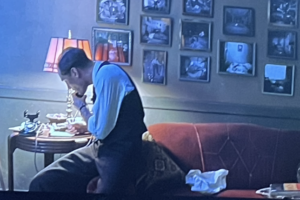I am a huge supporter of the First Amendment. You know – the one that gives us the right to free speech, press, and religion. I even support the right to do or say things that are offensive (say, make a racial slur or even burn the flag) because I believe that the Constitution gives us the right to be jerks as long as we do it in a "peaceful" way as allowed by law.
I am also a supporter of the Second Amendment. You know – the "right to bear arms" one that gets argued about an awful lot from time to time (actually that whole Bill of Rights thing was a pretty good idea, not just the first two parts). So, it causes a little conflict in me when I talk with families about how I feel about first-person shooter games (FPSs). My feeling is that, in general, kids shouldn’t play them. This doesn’t mean I don’t support the companies’ rights to manufacture these games, or an adult’s right to play them, but I simply don’t think that a young child should play a game that simulates shooting other people, with graphics so advanced that the game looks real. This is not Space Invaders or Pacman; these are games in which the player takes the perspective of a shooter and tries to kill as many enemies as possible, be they rival gang members, terrorists, or mobsters.
I refuse to buy into the panicked, naïve idea that playing these games actually causes violent behavior. But I do subscribe to the notion that these games can desensitize us to violence. It is very important not to confuse correlation with causation. In other words, if a child plays these games and then acts out violently, it doesn’t necessarily mean that the game caused him to behave in such a way. A more likely scenario is that he was attracted to these games because he already had a fascination with violence, perhaps a high level of anger or other negative feelings, and the games filled a need in him. He may still have acted out aggressively, but what if the exposure to the video games made it more likely that he would do so, or made his actions that much more aggressive? In fact, no major studies have found an outright cause and effect relationship between FPSs and violent behavior, but some correlations have been found, as well as evidence that perhaps children already predisposed to violence are more at risk for engaging in violent behavior because of the games. Relationships have also been found between violent behavior and an interest in violent movies or books, careless or aggressive drag racing and interest in racing games, and so on. Not surprising, of course. If you have a lot of anger, and feel a desire to act out aggressively, violent games or movies will be more appealing to you than those of other genres.
Can we blame the gaming industry or other media when something bad happens? History says we can’t. Several years back two teenage boys shot themselves while listening to music by the band Judas Priest. In particular, they kept repeating one song that had the refrain, "do it, do it, do it." One boy survived, horribly disfigured and disabled by the gunshot wound to his face and head. He and his family sued the band and lost (and I cheered for that pesky little First Amendment!). There were too many factors at play to attribute culpability to the band: the boys had unstable home lives, they were alone each afternoon, unsupervised, and often spent the time taking drugs, drinking, playing with guns, and listening to heavy metal music. After the suicide attempt, the survivor would ride his bike around town purposely scaring small children with his appearance. He eventually did succeed in killing himself, I believe by an overdose. Clearly these boys were troubled; troubled enough to take a shotgun to their faces, but they could not prove that the music they were listening to caused their behavior.
That being said, it’s been decades since it was proven without a doubt that children do model behavior after what they see. In a landmark study, children were given access to a "Bobo" doll, which is a large doll that stands alone, is weighted at the bottom, and looks clown-like. Much like the little "Weebles" many of us had as children, the Bobo’s weighted bottom causes it to wobble back and forth, but it is not likely to fall over. Its size makes it perfect for children to interact with, since it stands about lifesize to a small child. The children watched adults play with the doll, and these adults were either kind to it (e.g., hugging it, simulating feeding it, etc.), or violent (e.g., punching or kicking the doll). Not surprisingly, the children modeled what they saw. Some were kind to the doll, and some punched the doll, depending on what they had seen the adults do previously. This study is still held up as proof that children learn by example. From this, obviously, we can extrapolate that playing FPSs, putting oneself in the position of killing off characters, may make a child behave in such a way outside of the game. While killing an actual human being is many steps removed from punching a plastic doll, it is not out of the realm of possibility that FPSs may make it more likely that a child already predisposed to violence can be desensitized enough to engage in violent actions against another person. I am not saying that anyone can be pushed into shooting another person; quite the contrary, I think most of us would not do such a thing no matter how many videogames we play, but I do think that the violent and realistic nature of these games can cause some desensitization. After all, similar technology has been used for years to train soldiers so that they are desensitized to the act of killing.
We have been desensitized to many things in our current society. We used to go into a separate room in order to have phone conversations, now it is commonplace to hear private issues discussed on public streets or in supermarkets. Profanity is no longer shocking, as more is allowed to make it past the censors. I am forever fascinated and a bit appalled that so many of the "funniest" home videos involve people falling down and getting hurt. Perhaps my lack of interest in FPSs is just an extension of my lack of interest in watching someone fall and hit his head while we all laugh at his plight. I’m not sure that we need to encourage even more desensitization to violence by letting kids play FPSs.
The gaming industry has adopted a rating system to help parents decide which games are right for their children. Parents who wouldn’t take their child to an R-rated movie due to nudity or other sexual content allow their children to play M-rated video games full of violence. There seems to be some logic lacking in this practice. I wonder if the parents question why the child would rather play a FPS game than perhaps a football game, or a less realistic game involving aliens. Aside from the content, another worry is also the amount of time spent on these games. Many children I work with spend huge amounts of time playing video and computer games, some to the point of obsession. One teenage boy I work with realized that his gaming was getting out of control when he was barely sleeping and fell behind on most of his school work because he was playing games after his parents went to bed. He was successful in limiting his time on the games but still becomes extremely excited when a new game arrives and we have to set limits as to when and for how long he will play it. Maybe a little bit of time on these games doesn’t indicate a problem; after all, many people like the diversion of a scary movie or book for a limited amount of time, but a preoccupation with the games can indicate a problem.
Like many things in life, the effects may not be seen for years and are determined by many factors. It is very likely that the children who act out violently after playing FPSs, watching a horror movie, or listening to loud, angry rock music, have some predisposition to this behavior, whereas many children engage in these behaviors and wouldn’t dream of hurting a fly. I guess my approach is to not tempt fate, to keep these games from children for as long as possible, so they don’t start the desensitization process too early in their development. Even if only a small percentage of children would want to act out what they saw on the screen, maybe caution can prevent such an event. Even if most children wouldn’t act out anything they saw, prudence might at least help them to learn to have more value for human life. If I were working with a child who enjoyed FPSs, I would explore why he prefers these to other games, or how it feels when he is playing. It is hard for me to understand the thrill of "killing" on-screen enemies, even though I have experienced the thrill of target shooting. Maybe for the kids who play these games, the pixel people are merely analogous to a cardboard target, but if I shoot a smiley face on an index card, a beer can, or a bull’s eye, I am clearly shooting something non-humanoid, whereas to start shooting at life-like animation might feel very different-less like I am practicing a skill and more like I am shooting targets that look like my fellow man.
My advice to parents is this: be aware of what your kids are playing, what they are doing, how they are using the computer. On a daily basis they get more computer-savvy than any of us can hope to be, and we need to watch what they are doing. Many parents allow their children to play these games because they have no idea what they really look like; they remember games like Pong and Asteroids and can’t imagine the realism of today’s computer games. If you haven’t checked them out, you can’t make an informed decision. If you do choose to allow your children to play these games, don’t forget to balance it with a little kiss on the head of the Bobo doll. It may go a long way.
Dr. Barbara Kapetanakes practices psychotherapy in Sleepy Hollow.






